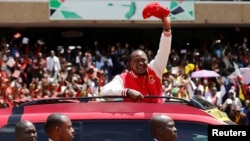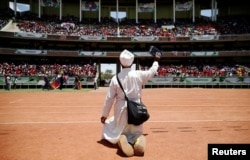Tens of thousands of cheering supporters filled a Nairobi sports stadium Saturday, as Kenya's President Uhuru Kenyatta and his deputy William Ruto launched their new Jubilee party, with the addition of 11 other parties. The announcement comes less than a year before the presidential election.
Kenyatta emphasized togetherness as the main reason for the merger, saying, "the party we launch here today is an expression of our unity," and "in launching it, we renew and strengthen our ties that bind Kenyans together."
But some analysts believe this announcement was more for show than for substance.
University of Nairobi department of political science chairman Adams Oloo believes the real reason for the rollout was for Kenyatta and Ruto to announce their reelection campaign, and to insulate them against potential problems in 2017.
"You know, in Kenyan elections, there is always accusations of rigging," Oloo said. "This was just for show, so that should some rigging occur in future, they can basically say, ‘You saw our might’ by the number of people who crossed over."
Oloo argues that many of the 11 parties were "dormant parties" that do not have any electoral representation, even at the county level. And he notes that none of the opposition parties joined Jubilee.
"All these parties that reportedly are dissolving were already in a post-election coalition with the Jubilee government," Oloo said. "You did not hear ODM [Orange Democratic Movement] dissolving, you did not hear Ford-Kenya dissolving, you did not hear Wiper dissolving, you did not hear Amani National Congress dissolving."
Political writer Barrack Muluka agrees with Oloo that the merger won't make much difference in the upcoming elections. But for those who made the switch, there will be expectations for Kenyatta.
"The only thing that has happened is that they have ceded their independence and now come into one," Muluka said. "And if you have left your party to come and join him, if you have allowed your party to dissolve, to fold up, and to now come under a party that is directly under his control, you expect some good returns. And the returns here would be that whether you win the election or you lose, he will remember you."
Muluka adds that if Kenyatta and Ruto truly want to unite Kenyans, they must make real changes in Kenyan society.
"[They] must make the next step, which is to bring the rest of Kenyan ethnic groups together with them, and that they are not going to do through, ‘Come, let us be under one party,’" Muluka said. "They are going to do that and achieve that through a sense of redistributive justice in economic and social development in the country. Not just nominally having people under one political party umbrella."
The International Criminal Court previously charged Kenyatta and Ruto with involvement in Kenya's 2007 and 2008 post-election violence, in which more than 1,000 people were killed. Both cases were dismissed, after prosecutors said the government interfered with efforts to collect evidence.
Ruto told party delegates on Friday that the new party would bring normalcy to the country, and that he believed multiparty democracy had contributed to past electoral violence.
Meanwhile, on Saturday, Kenya's leading opposition party ODM, led by party leader and former prime minister Raila Odinga, held a tenth anniversary celebration in Mombasa to coincide with the timing of the Jubilee announcement.
The country's elections are scheduled for August 2017.





